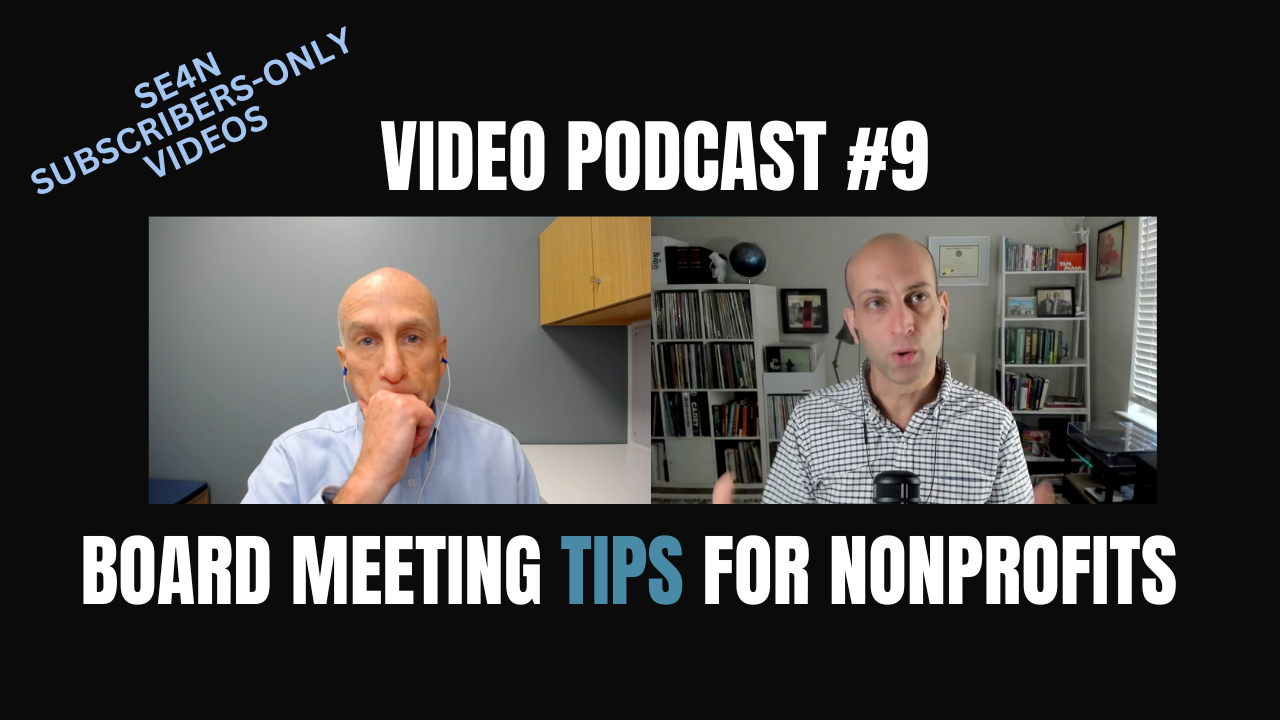
Blog.
Most Recent Posts
![TEMPLATE: Resolutions for First Meeting of Nonprofit Board [SUBSCRIBERS-ONLY]](https://images.squarespace-cdn.com/content/v1/5e6ccadfb4659c1d51df14d5/23e0c531-cd9a-46e5-9094-fee25f337930/meeting-6657312_1920.jpg)
TEMPLATE: Resolutions for First Meeting of Nonprofit Board [SUBSCRIBERS-ONLY]
This template provides a standard set of resolutions for a newly formed nonprofit organization convening its first Board of Directors meeting. This sample document includes language covering actions such as adoption of Bylaws and key policies, officer appointments, banking authorizations, authority to file the Form 1023 and other applicable tax exemption applications or registrations, and more.

VIDEO Q&A for Subscribers: June 2025
Ben and Mike answer questions from subscribers about preparing to serve on a nonprofit Board of Directors, the pros and cons of group exemptions, mitigating auditor concerns about pledges receivable, and whether the rationale for a Board member's dissenting vote should be included in Board meeting minutes.

VIDEO Q&A for Subscribers: March 2025
Ben and Mike answer questions from subscribers about record-keeping and document retention practices, using LLCs to limit liability risk in a fiscal sponsorship, disclosure of committee meeting minutes as part of the audit process, whether abstaining Board are counted for purposes of satisfying unanimous written consent procedures, and whether a quarterly Board meeting can be delayed into a subsequent quarter.

VIDEO Q&A for Subscribers: February 2025
Ben and Mike answer questions from subscribers about how to navigate a financial environment in which grand funding is uncertain, whether people under 18 years old can serve on a nonprofit Board of Directors, whether membership dues are treated as donations or fees for services, and whether a last-minute item can be added to the Board meeting agenda.

The Problem with Hybrid Meetings and Events
In-person meetings and events are completely different animals from virtual meetings and events and that difference needs to be recognized and respected. In-person and virtual formats work best when they are exclusive and not combined into a “hybrid” format. While hybrid meeting and event formats may be used occasionally in response to unexpected disruptions, they should not be viewed as the new normal or a long-term option for the future.
![VIDEO Q&A for Subscribers: September 2024 [SUBSCRIBERS-ONLY]](https://images.squarespace-cdn.com/content/v1/5e6ccadfb4659c1d51df14d5/f0598e46-14f4-464c-8b03-5ce99563762d/SE4N+Video+Q%26A+2024-09.png)
VIDEO Q&A for Subscribers: September 2024 [SUBSCRIBERS-ONLY]
Ben and Mike answer questions from subscribers about whether nonprofit organizations should require employees and Board members to provide receipts for small dollar expense reimbursements, tips for properly using executive sessions in Board of Directors meetings, and issues raised by nonprofits providing capacity building support to other nonprofits.

How to Make Virtual Board and Committee Meetings More Effective
As the default format for Board and committee meetings has shifted to a virtual platform, nonprofit organizations must be careful to not let these regularly recurring governance meetings become stale and boring. It is time to freshen up these virtual governance meetings with a renewed focus on the smart use of time, attendee satisfaction, and maximizing impact and engagement.

VIDEO PODCAST: Board Meeting Tips for Nonprofits
Ben and Mike discuss tips and recommendations to help nonprofits make their Board meetings more efficient and impactful, including best practices related to advance notice and distribution of Board materials, creating a meeting agenda, use of a "consent agenda," and whether nonprofits should follow Robert's Rules of Order.
![CHECKLIST: Virtual Board and Committee Meeting Tips [SUBSCRIBERS-ONLY]](https://images.squarespace-cdn.com/content/v1/5e6ccadfb4659c1d51df14d5/502237bc-b021-4573-8d4f-982a1b6e729c/benjamin-child-GWe0dlVD9e0-unsplash.jpg)
CHECKLIST: Virtual Board and Committee Meeting Tips [SUBSCRIBERS-ONLY]
The default format for traditional governance meetings (Boards of Directors, committees, working groups, etc.) has shifted to a virtual setting. However, most governance meetings still use agendas, approaches, and meeting structures based on old “in-person” meeting formats. This 4-page checklist is designed to help you freshen up your virtual Board and committee meetings, make them more effective, and improve participant engagement and satisfaction.
![VIDEO Q&A for Subscribers: August 2024 [SUBSCRIBERS-ONLY]](https://images.squarespace-cdn.com/content/v1/5e6ccadfb4659c1d51df14d5/94ba66db-acce-4fa3-8f98-f369cd6d48d0/SE4N+Video+Q%26A+2024-08.png)
VIDEO Q&A for Subscribers: August 2024 [SUBSCRIBERS-ONLY]
Ben and Mike answer questions from subscribers about whether fixed assets and restricted funds can count toward a nonprofit organization's operating reserves, the pros and cons of taking over an existing 501(c)(3) organization rather than starting a new one, how abstentions are counted in a Board vote, and whether an organization should use a credit card or debit card.

Five Nonprofit Bylaws Issues That Are Often Overlooked
All nonprofit organizations should regularly review and assess their Bylaws to ensure this key governing document complies with the law and is optimally aligned with the organization’s governance needs and operational practices. The following are five common Bylaws oversights to look for when doing your organization’s next Bylaws review.
![Seven Key Steps for Managing Nonprofit Corporate Governance Disputes [SUBSCRIBERS-ONLY]](https://images.squarespace-cdn.com/content/v1/5e6ccadfb4659c1d51df14d5/1684850686845-BLMLI9MTHUVKFV4FHBS9/pexels-alex-neri-6721364.jpg)
Seven Key Steps for Managing Nonprofit Corporate Governance Disputes [SUBSCRIBERS-ONLY]
For most nonprofit organizations, it is a rare occurrence for internal corporate governance disputes to escalate to the point of litigation. However, court cases are sometimes unavoidable. A notable D.C. Court of Appeals decision addressed several important issues related to corporate governance challenges and illustrated some key steps nonprofits can take to better manage these disputes.

Q&A #157 – What are the legal limits of an Executive Committee’s authority?
Executive Committees are often granted wide-ranging authority to the to act on behalf of a nonprofit organization and exercise the powers of the Board of Directors in between Board meetings. Absent additional, clarifying language in the Bylaws, committee charter, or Board resolutions, there are generally few legal limitations on an Executive Committee’s authority. However, there are some explicit and implicit limits that are important to consider

Q&A #148 – How far in advance must Board meeting materials be sent to Board members?
In most cases there are few explicit requirements regarding when meeting materials must be provided to Board members (such as the agenda, minutes of the last meeting, executive director and committee reports, financial reports, and proposed resolutions). Any specific requirements are typically found in an organization’s Bylaws, policies, or meeting guidelines, if at all. State nonprofit corporation statutes do not usually have strict requirements on this issue but check applicable state laws to be sure.
![Use This Simple Question to Improve Board and Committee Member Engagement [SUBSCRIBERS-ONLY]](https://images.squarespace-cdn.com/content/v1/5e6ccadfb4659c1d51df14d5/1695142653698-88XAU223OH4O5CJQD7K3/isabel-maria-guner-velasco-M3ymaLBPMQ8-unsplash.jpg)
Use This Simple Question to Improve Board and Committee Member Engagement [SUBSCRIBERS-ONLY]
Keeping nonprofit organization Board and committee members engaged is often more art than science. The reason this task is so difficult is because of the delicate balancing act between gratitude and appreciation. It is relatively easy to show gratitude and thank volunteer leaders for attending meetings. It is another thing to make sure these volunteer leaders leave each meeting with a feeling that it was a good use of their time, that they were actively involved in discussions, and the organization appreciated and valued their input.